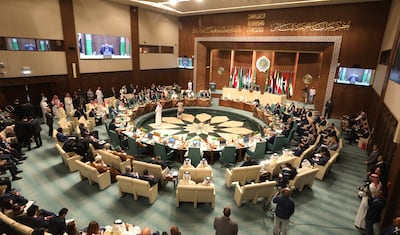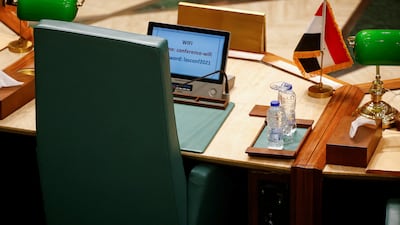Syrian President Bashar Al Assad has signalled his willingness to accept the Arab League's terms for his country's conditional return to the bloc.
The 22-member organisation met in Cairo on Sunday, where it voted to allow Syria's readmission after more than a decade of isolation.
Mr Al Assad spoke with UAE President Sheikh Mohamed over the phone and expressed his appreciation for the role the Emirates had played to improve Arab relations.
Syria's official news agency Sana and UAE news agency Wam reported the conversation on Monday.
A day earlier, Dr Anwar Gargash, diplomatic adviser to the UAE President, said Syria's return to the Arab League was "a positive step that reactivates the Arab role".
"The challenges facing the region require strengthening communication and joint action to ensure the interests of the Arab countries and their peoples," he said.
Damascus said the next stage required an effective and constructive Arab approach on a bilateral and collective level.
“Syria stresses, in the same context, the importance of dialogue and joint action to confront the challenges facing Arab countries,” its Foreign Ministry said.
The Arab League decided Syria could resume its participation in meetings immediately but called for a resolution of the crisis resulting from the country's civil war, including the flight of refugees to neighbouring countries and drug smuggling across the region.
As part of the deal reached on Sunday, a committee will be set up to maintain direct communication with the Syrian government to reach a comprehensive solution to the conflict.
The committee will comprise the head of the Arab League and the representatives of Egypt, Jordan, Iraq, Saudi Arabia and Lebanon.
The other requirements of the league include continued efforts to arrange the delivery of aid in Syria.

Syria's readmission follows a Jordanian initiative that laid out a road map to end the country's conflict.
The initiative covered the issues of refugees, missing detainees, drug smuggling and Iranian militias in Syria.
Jordan is both a destination and main transit route to Gulf countries for the smuggling of Captagon, a highly addictive amphetamine produced in Syria.
Amman has hinted it could take unilateral action to curb the multibillion dollar trade.
A Jordanian official told Reuters that Syria would need to show its seriousness in reaching a political solution to the 12-year conflict before any effort to lobby the West to lift sanctions can start — a crucial step for funding reconstruction in Syria.
Saudi Arabia, which is set to host the next Arab League meeting on May 19, has been leading efforts to bring back Mr Al Assad’s government back to the Arab fold.
Lebanese Parliament Speaker Nabih Berri lauded the Arab League’s decision to reintegrate Syria.
“Although this decision was delayed for years, it is a step in the right direction and in returning to Arab correctness, which can only be straightened by unity of class and word,” the Lebanon National News Agency quoted Mr Berri as saying on Sunday.
“With the return of Syria to the Arabs and the return of the Arabs to it, there is a glimmer of hope for a new resurrection of joint Arab action.”
Departing Foreign Minister Abdallah Bou Habib recalled that Lebanon was one of the first countries to ask for Syria’s return to the Arab League.
“Syria must resume its essential role within the Arab League,” he said in an interview with the Kuwaiti newspaper Al Anbaa.
Mr Bou Habib cited a 2013 World Bank report that said displaced Syrians cost Lebanon $3 billion every year.
He said that the cost had since risen to $6 billion, higher than what the international community contributed to alleviate his country's economic crisis.
Qatar, one of the few Arab countries that has refused to consider the normalisation of ties with Syria, said on Monday that while its position remained unchanged, it would not oppose the readmission of Damascus.

“Qatar always seeks to support whatever achieves Arab consensus and will not be an obstacle to that,” said Doha's Foreign Ministry spokesman Majed Al Ansari.
“However, Qatar’s official stance on normalisation with the Syrian regime is a decision primarily linked to progress in reaching a political resolution that realises the aspirations of the brotherly Syrian people.”
The US, which has said it would not normalise relations with the Assad government, denounced the Arab League's move.
"We do not believe that Syria merits readmission to the Arab League at this time," State Department spokesman Vedant Patel told reporters at a press briefing.
Russia, a staunch supporter of the Assad government, hailed the Arab League’s decision to reinstate Syria’s membership, describing it as an action that showed Arab countries were intent on conducting their own “independent policy on the global stage”.
“We think that the decision of the Council of Arab League Foreign Ministers has demonstrated the Arab countries’ aspiration to bolster co-ordination of actions in the interests of settling pertinent regional and international issues and confirmed their intent to continue conducting their independent policy on the global stage based on their core interests in the future,” Russian Foreign Ministry spokeswoman Maria Zakharova said.
Many observers had anticipated Syria’s imminent return to the organisation.
Arab rapprochement with Damascus hastened after the February 6 earthquake that shook parts of the war-torn country.
Efforts to readmit Syria have been time sensitive. The Arab League normally meets every November but its summit this year was brought forward to May 19 at the request of Saudi Arabia, which will host the talks.
Founded in 1945, the Arab League is a loose alliance of about two dozen Arabic-speaking countries that have pledged to co-operate on matters that include economic and military affairs.
The group makes decisions on a simple majority basis but there is no mechanism to compel members to comply with resolutions.


